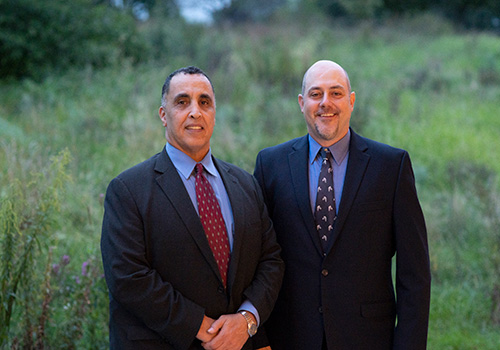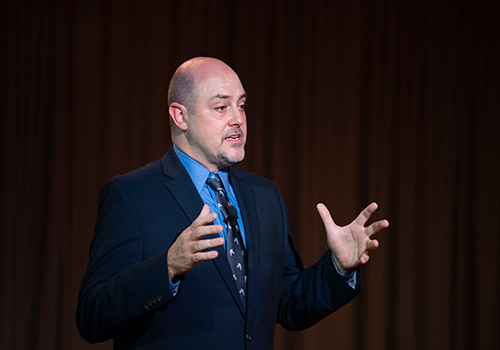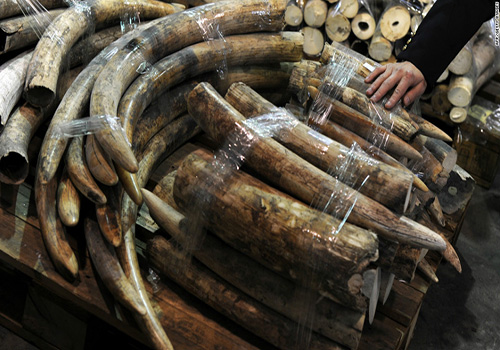Topics
The insatiable demand for animal parts, including elephant tusks, pangolin scales, rhino horns, and tiger parts, has made wildlife trafficking the fourth largest global criminal network, bringing in upwards of an estimated $23 billion a year. Increased consumer activism and wildlife advocacy has led some countries to ban the sale of animal parts. Hong Kong, for instance, a major port for wildlife traffickers, will ban all ivory sales by 2021. While this is a significant step, these sophisticated criminal networks have no borders, says Mark Fowler, former Director of the Nature Initiative. In a Q&A with Rod Khattabi, Grace Farms’ Director of Law Enforcement & Risk Officer, they discuss how their collaborative approach to combat wildlife trafficking is advancing the fight against global trafficking.
Fowler has devoted his career to preserving the natural world and combatting wildlife trafficking, while Khattabi has more than 30 years of experience investigating global crime syndicates, including smuggling, espionage, counterterrorism, human trafficking, and fraud.
They recently traveled to Zambia to conduct multi-agency workshops for law enforcement officers and wildlife directors from the African Union. Member countries that participated included Angola, Botswana, Lesotho, Malawi, Mozambique, Namibia, South Africa, Tanzania, Zambia, and Zimbabwe. The organizers: The African Union Commission, Lusaka Agreement Task Force, Enhancing Africa’s Responses to Transnational Organized Crime (ENACT), and the Institute for Security Studies. The European Union Commission funded the workshops.

Rod Khattabi, Director of Law Enforcement & Risk Officer, and Mark Fowler, former Nature Initiative Director © Julien Jarry
Q: Can you provide an overview of your trip to Zambia?
Khattabi: Zambia hosted high-level representatives and law enforcement from ten countries. We discussed all the challenges they are facing in wildlife trafficking and how to collaborate and work together by using all available investigative tools. It’s also about networking and talking to each other to establish trust.
Part of our mandate at Grace Farms Foundation is to enhance the collaboration between countries, law enforcement, and our partners. We can bring our expertise to the collaboration. Many of these countries don’t talk to one another or share information because they don’t have the capacity and funding. They also don’t trust each other. That is how we can help build trust through these collaborative workshops.
Fowler: We were invited to Zambia because we are one of four NGOs doing this. Only three other organizations work directly with law enforcement – Wildcat Foundation, OAK Foundation, and PAMS Foundation. When I teamed up with Rod at Grace Farms, I said “Look, we’ve got something unique. We have a strategy to directly support law enforcement in wildlife conservation.”
Q: What are these criminally trafficked animal parts used for?
Fowler: A lot of illegal wildlife demand comes from what animal parts can be used for. From jewelry made from ivory to rhino horns used in traditional Chinese medicine, animal part are a very lucrative trade. Rhino horns, for instance, are more expensive than gold and diamonds; owning a rhino horn is considered a status symbol.
The Chinese mammal, the pangolin, which is almost extinct, is also sought after for its scales for medicine and its meat is considered a delicacy. Tiger parts are also used in Chinese medicine, too.
Not only are these animals killed in the wild for their parts, they are also captured and raised in captivity for their parts.
Q: What about corruption?
Khattabi: Corruption is everywhere, including unfortunately, in the United States to a certain degree. But you have to try to root it out. By collaborating during these workshops, we can vet certain teams that we can work with. During the investigations we can help by applying pressure to [higher-up country authorities] so law enforcement can continue their investigations. The pressure can potentially get corrupt officials off law enforcement’s back so the investigation can continue.
By putting pressure on the criminals as well, they will hopefully shift their focus onto something else.
Fowler: If you are an organized criminal of a syndicate, you want something that has low risk and high rewards. They look for opportunities where there are very few prosecutions; very few investigations. In Tanzania, for instance, between 2009 and 2014, Tanzania lost 60 percent of its elephants.
That’s how bad it is – there is no enforcement and no strategy to go after the higher echelon of these organized crime syndicates. They can be arrested and three days later perhaps they are back on a plane to China. [A great deal of demand for animal parts comes from China.] Poaching is costing, Tanzania, a major tourism destination, and the region millions in lost tourism revenue.
But there have been breakthroughs. In 2014, a small NGO named PAMS, very lean and mean, came in and directly supported the anti-poaching task force of Tanzania. That was big. Few NGOs were getting down to this level and working with law enforcement operations. This was before we launched our Foundation in 2015. We would later become partners with PAMS.

Mark Fowler, former Nature Initiative Director © Julien Jarry
Direct support of law enforcement agencies is helping to reduce the poaching in Tanzania and the region. Also, strict ivory bans in countries such as the UK, are also helping to reduce poaching. South Africa has also seen a decline in poaching of its rhinos. South Africa holds nearly 80% of the world’s rhinos. More than 1,000 rhinos have been killed each year between 2013 and 2017 and the numbers dropped below 1,000 a year in 2018. Even so, the numbers are still high considering the number of rhino organizations trying to save them. The process is still ineffective; more than two rhinos are killed per day.
Q: What are some challenges during an investigation?
Khattabi: These countries face a lot of challenges such as the lack of training. For instance, consider chain of custody. These countries don’t have a real good chain of custody.
You need a chain of custody when you present evidence in court. If there is a break in the chain that’s a problem because you can’t justify the ivory has been stolen. Or you can’t justify an animal has been killed. These are examples of breaks in the chain. Once the chain is broken, how are we going to know that evidence was involved in the crime? So, you need integrity in the chain of custody. That’s part of the problem because [law enforcement] don’t know how to establish a good chain of custody. The case then gets dismissed.
Q: Describe the training conducted.
Khattabi: We help them think about how the investigation will be conducted. We advise them that they might want to consider seizing assets. The assets are so important. While we were in Tanzania, we didn’t hear about one case of financial seizure. Countries don’t have the funding to be able to conduct investigations. Investigations can be costly: One of my investigations cost $2 million dollars.
[Throughout his career, Rod has seized $35 million in assets, which has helped fund his investigations.]
We also teach law enforcement that it’s not only about arresting the bad guys, but it’s also about seizing assets. You can use those assets to conduct further investigations and to become self-sustaining.
Fowler: Africa is so far behind on these concepts. But it was important for wildlife crime units and heads of national anti-poaching tasks forces, to hear these messages. They have millions of dollars sitting in assets that are wasting and can be used for investigations.
They have asked us to come back to do serious training in asset forfeiture and seizures. We can help them because we have the expertise in breaking up transnational organized crimes. Whether it’s wildlife trafficking or drugs, the same principals of investigation apply.
Khattabi: We are case-specific with on-the-job training. These governments bring us ongoing criminal cases to work with because we are vetted and trusted by those governments. This allows us to successfully prosecute cases.
We are also helping them to establish probable cause, helping them to make an arrest warrant, seize assets, including the criminal’s financial assets. This can all lead to a conviction. The arrest is only a start.
Q: Explain financial seizures.
Khattabi: Every government has what we call a general fund. When you seize assets – forfeited assets – and freeze the assets for investigative purposes. But the assets won’t be forfeited until you prove the money or assets are ill-gotten.
But you can seize the asset if you have a probable cause to do so. It’s a long drawn out investigation and a lot of countries and their law enforcement representatives don’t have that type of experience. I help them go through all this.
The forfeited money goes to the government and the investigative agency can apply to get a percentage allocated to future investigations. So now we’re talking about an agency that’s going to be well-funded based on money seized. They can now be more productive in their investigations. There are some investigations that have been dropped because they don’t have enough money, not even enough for basic things such as gas and drones for surveillance.

A seizure of elephant tusks in Hong Kong, a major gateway to mainland China, where the demand is high for ivory and other animal parts. © CNN
Q: Is it unusual for countries and high-level representatives to work together?
Khattabi: It’s unusual to have ten countries willing to work together; they are not used to sharing information. We help them think and act outside the box. During the hands-on training we give them the investigative tools, too.
Fowler: Listen, conferences go on all the time. At Grace Farms we don’t believe in conferences, we believe in results. In working as advisors to our partners, we have broken up multiple supply syndicates in the last few years – dozens of arrests, tons of seizures. In Cambodia, for instance, we helped [in an advisory capacity] in a seizure of ivory – 3.5 tons. Part of getting results is getting countries to work with each other, to share information.
Khattabi: I can also provide advice on WhatsApp. I’m doing this with different countries. A lot of times I will receive a call on WhatsApp requesting advice about ongoing criminal investigations.
Fowler: With this new strategy we focus on capacity building. Rod advises on how to build an investigation, using interrogations, financial investigations. He also provides hands-on training on assets forfeitures and seizures. I work on how are we going to work together, including with the NGOs, to get results.
Q: What’s next in your work?
Fowler: We have already worked with 16 countries just in the last two years. Central Africa, East Africa, Southern Africa, all throughout Southeast Asia. Now they all know each other through multiple trainings and they are becoming colleagues.
We are now going to focus on a four-country level – Malawi, Zambia, Mozambique, and Tanzania, helping to facilitate the cross-border task force. The most trafficking is through these porous borders. For instance, the criminals will hunt ivory in Tanzania and they will traffic ivory across Mozambique to ship it.
Tanzania has done such a good job now that the bad guys are moving to Uganda and Mozambique. So now we have to start working with those countries to break it up on their side of the border. We’ll be creating a strategy to directly support them. We have to start breaking down the bureaucracies and be as nimble and as organized as the criminal syndicates.
This is the future.
Sign up for our newsletter to learn more about Grace Farms’ programs and initiatives: nature, arts, justice, community, and faith.

